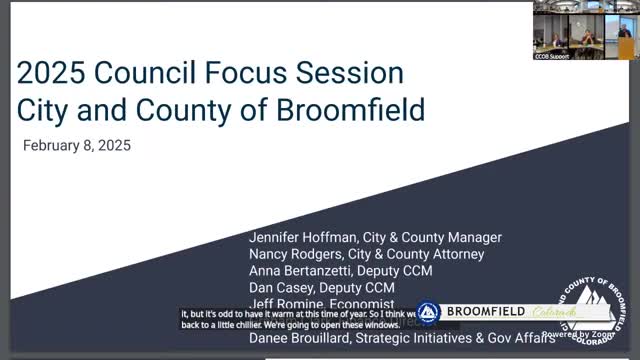Broomfield leaders call 2025 “stable but fragile,” push disciplined budgeting and long-range planning
Get AI-powered insights, summaries, and transcripts
Subscribe
Summary
City and county staff on Saturday told the Broomfield City and County Council that the jurisdiction’s finances are “stable yet fragile,” and urged disciplined, data-driven budgeting for 2025.
BROOMFIELD, Colo. — City and county staff on Saturday told the Broomfield City and County Council that the jurisdiction’s finances are “stable yet fragile,” and urged disciplined, data-driven budgeting for 2025.
City and County Manager Jennifer Hoffman opened the 2025 council focus session by saying the staff and council must balance limited funds against existing obligations. “We are stable yet fragile,” Hoffman said, and she repeated that discipline and reallocation — not new spending — must guide the coming year.
Nut graf: Staff presented a package of short- and medium-term actions to protect the general fund, complete a long-range financial plan update and prepare three planned bond issues. Finance staff reported the city reached a 20% reserve goal early in 2025 but said projected expenditures will modestly outpace revenues in 2025–26 unless departments adjust spending.
Graham Clark, introduced as the finance director, and other staff summarized preliminary, unaudited 2024 results and projections. Clark told council that the general fund ended 2024 in positive position but cautioned that the enterprise fund — which covers water and wastewater services — “is not” currently stable and will require separate attention. Clark said long-range modeling shows modest revenue growth (roughly mid-single-digit) and continued personnel- and inflation-driven expenditure growth (roughly high-single-digit), producing a gradual erosion of fund balance if no steps are taken.
Staff laid out next steps: a focused update of the long-range financial plan in 2025, additional quarterly budget “touch points” with council, and tighter scrutiny of one‑time versus ongoing spending. The plan will explicitly separate governmental (general) and enterprise funds when modeling fiscal outcomes, staff said, to avoid moving money across those distinct fund types.
Staff also flagged near-term debt actions. The council has set aside about $7 million of cash toward a planned police facility; staff expect to issue bonds in 2026 for that project and to pursue separate financings to support enterprise capital projects (water tank and wastewater treatment plant expansions). Staff said the city’s recent bond rating upgrade will reduce borrowing costs when the city sells new bonds.
On technology and operations, staff announced two management initiatives intended to improve fiscal transparency: (1) a planned ERP (enterprise resource planning) procurement and implementation to replace legacy financial systems, with vendor demos starting in March and implementation slated to begin in the fall; and (2) a structured long-range financial plan update that will incorporate 2024 actuals, updated land‑use forecasts and a refreshed set of economic assumptions.
Quotes and context were presented throughout the session. Hoffman emphasized repeatable processes and conservative assumptions. Clark said the city’s budget philosophy for 2026 will focus on reallocation of existing resources rather than adding new programs, and that departments should plan for “limited capacity” to add FTEs in the next cycle.
Ending: Staff scheduled additional study sessions and quarterly updates through the spring and summer so council can review the long-range plan and budget assumptions before the formal 2026 budget process begins. Council and staff repeatedly framed 2025 as a year for outcomefocused discipline rather than new initiatives.
